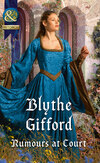Buch lesen: «Rumours At Court»
Wed by royal command!
Widow Valerie of Florham wants nothing more than to forget her abusive marriage and live peacefully at the mercy of no man. She’d never have dreamed of a liaison with handsome Sir Gil Wolford, but then comes a royal decree—they must wed!
Gil craves military conquest in Castile, far from his haunted past. Marriage to Lady Valerie is the last thing he should want, yet both have truths to hide from the rumormongers at court. They have no choice...and, once wed, the marriage bed changes everything!
You are cordially invited to Blythe Gifford’s
Royal Weddings
A hint of scandal this way comes!
Anne of Stamford, Lady Cecily and Lady Valerie serve the highest ladies in the land. And with their close proximity to the royal family they are privy to some of the greatest scandals the royal court has ever known!
As Anne, Cecily and Valerie’s worlds threaten to come crashing down three men enter their lives—dashing, gorgeous, and bringing with them more danger than ever before. Suddenly these three strong women must face a new challenge: resisting the power of seduction!
Follow Anne of Stamford’s story in
Secrets at Court
Read Cecily, Countess of Losford’s story in
Whispers at Court
Discover Lady Valerie of Florham’s story in
Rumours at Court
All available now!
Author Note
The monarchies of medieval Europe were a small, elite society. Kings and their families were expected to marry partners of similar stature, and such royal marriages were not expected to be love matches. They were arranged, like most medieval marriages, for reasons dynastic or financial, as heartless as a business transaction.
Even when countries were at war a marriage between royal families could create alliances, cement peace, or allow another ruler’s family the right to a distant throne.
But love has a way of interfering with such logical plans—for royals and for their subjects…
Rumours at Court
Blythe Gifford

After many years in public relations, advertising and marketing, award-winning author BLYTHE GIFFORD started writing seriously after a corporate lay-off. Ten years later she became an overnight success when she sold her Romance Writers of America Golden Heart® finalist manuscript to Mills & Boon. Her books, set primarily in medieval England or early-Tudor Scotland, usually incorporate real historical events and characters. The Chicago Tribune has called her work ‘the perfect balance between history and romance’.
She loves to have visitors at blythegifford.com, facebook.com/BlytheGifford and Tweets at twitter.com/BlytheGifford.
Books by Blythe Gifford
Mills & Boon Historical Romance
Royal Weddings
Secrets at Court
Whispers at Court
Rumours at Court
The Brunson Clan
Return of the Border Warrior
Captive of the Border Lord
Taken by the Border Rebel
Linked by Character
A Yuletide Invitation ‘The Harlot’s Daughter’ In the Master’s Bed
Stand-Alone Novels
The Knave and the Maiden
Innocence Unveiled
His Border Bride
Visit the Author Profile page at millsandboon.co.uk.
MILLS & BOON
Before you start reading, why not sign up?
Thank you for downloading this Mills & Boon book. If you want to hear about exclusive discounts, special offers and competitions, sign up to our email newsletter today!
Or simply visit
Mills & Boon emails are completely free to receive and you can unsubscribe at any time via the link in any email we send you.
For my editor, Linda Fildew, whose constant patience and support has made this journey possible.
Acknowledgement
Many, many thanks to author Deborah Kinnard, who dropped everything to double-check my Spanish translations.
I owe you, friend!
Contents
Cover
Back Cover Text
Royal Weddings
Author Note
Title Page
About the Author
Dedication
Acknowledgment
Chapter One
Chapter Two
Chapter Three
Chapter Four
Chapter Five
Chapter Six
Chapter Seven
Chapter Eight
Chapter Nine
Chapter Ten
Chapter Eleven
Chapter Twelve
Chapter Thirteen
Chapter Fourteen
Chapter Fifteen
Chapter Sixteen
Chapter Seventeen
Chapter Eighteen
Chapter Nineteen
Epilogue
Author’s Afterword
Extract
Copyright
Chapter One
London—February 9th, 1372
Despite the cold, it seemed all of London had turned out to gawk at the Queen and to see the Duke of Lancaster, or ‘My Lord of Spain’ as he now preferred, stand before them for the first time as King of Castile.
Sir Gilbert Wolford stood beside the man as he prepared to welcome his new wife, the titular Queen of Castile, to his grand palace on the Thames. A sense of unease threatened the triumph of the day. This was a celebration, yes, but of a battle far from won.
The English Parliament had accepted Lancaster, the son of England’s King, as the rightful Lord of Castile. Many Castilians, including the current King, disagreed.
But some day, Gil would return to the Iberian plains at Lancaster’s side. This time, he would not stop until they stood, triumphant, in the Palace of Alcázar. The token he had carried since their first attempt weighed heavily in his pocket—his promise to himself.
Gil spared a glance for the ladies gathered to greet the Queen. Lady Valerie, Scargill’s widow, stood among them. She had just come to court and they had not met, but she had been pointed out to him from afar, easy to find in her widow’s wimple, covered as completely as a nun.
He had a last duty to perform for her dead husband.
One he would rather avoid.
In Castile, Gil had been known by the enemy as El Lobo, The Wolf, because he would kill to protect his men. But no man could save them all. Not in war. He had not been able to save Scargill and now the man’s widow must bear the price.
The procession stopped before the palace. The event had been arranged as if the Queen were newly come, as if she and her husband had never met. In truth, they had married on the Continent months before so as to lose no time in creating an heir.
A son.
Gil resisted regret. At thirty, he had no wife, no son and no prospect of either. Nor would he until he could leave this island and his family’s past well and truly behind. El Lobo was a byname more flattering than the ones they called his family here in England.
The Queen’s litter was carried up the stairs, lurching from side to side until it reached the landing where the Duke stood. Then it was lowered and Constanza, the Queen, stepped out to approach her husband.
Accustomed to the heat of the Spanish plains, neither the Queen nor her retinue had arrived with cloaks to fight the British cold. Wearing borrowed mantles, unmatched and ill fitting, they looked every bit the court in exile.
Yet the Queen without a kingdom did not act humbled. Her husband John of Gaunt might be Duke of Lancaster and son of the English King, but he could call himself King of Castile only because she was his wife. It was her father, her blood that carried the right to rule.
Now, within sight of her husband, she nodded to an attendant who removed the cloak.
Behind him, the women of the household gasped.
The Queen’s red-velvet gown, bright as blood, drew every eye. She stepped towards her husband, slowly, with only slight deference. A mere inclination of the head. Barely a bend to the knee. Proud, young. At seventeen, little more than half her husband’s age.
Comely enough, Gil supposed. But no woman would ever replace the man’s dead Duchess. With her, he had found not only a dynastic partner, he had found love of the kind the troubadours celebrated. Could a man expect that twice?
Gil did not expect it at all.
And yet, in his dreams, he imagined standing in the peaceful gardens of Alcázar with a woman who gazed at him, eyes full of love...
Only a dream. Now was not the time for a wife, who, like the Lady Valerie, might too soon become a widow. Before he took a bride, he would be a new man in a new place, miles and years away from his tainted past.
He brought his mind back to the present day and passed to the Duke the velvet sack which held the wedding gift to Constanza. With two hands and proper ceremony, Lancaster presented his offering, but instead of taking it, she left him with arms outstretched, not reaching for it.
A slight so obvious that, instead of murmurs, the air carried only shocked silence.
Gil hoped she had hesitated for fear her fingers were too cold to hold it safely.
Finally, she nodded to the man next to her. With one hand, he grasped the bottom of the bag while, with the other, he pushed it aside to reveal a gold cup, carved like a rose, covered with a lid featuring a dove in flight.
It was one of the most beautiful creations of a man’s hand that Gil had ever seen.
But the lady did not smile to see it. Instead, she waved it away to be cared for by one of her attendants.
Gil gritted his teeth, frowning. The woman should be more grateful. If the Duke had not come to her rescue, she and her sister would still be homeless, orphaned exiles in France. Only with her husband’s help did she have any hope of regaining the life and title she had been born to.
The Queen motioned to one of her counsellors, a heavy-set Castilian priest with a wide forehead, who stepped forward and began to speak.
‘La Reina asks me to say she is happy to greet her husband, Monseigneur d’Espagne.’
Halting English, Gil thought, but better than that of the Queen, who, he understood, spoke little but Castilian.
‘Tell Her Grace,’ John said, looking at Constanza, ‘that I welcome her to London.’
Another whispered conference. The woman’s lips thinned and she spoke sharply to the priest.
He cleared his throat and faced his ‘King’ again.
‘La Reina says that she hopes her stay here is brief. She expects you to return to her homeland and restore her throne before the year is out. Until she goes home to Castile, she asks that I give you all assistance to administer the state and plan for battle.’
Now, it was the smile of the Duke, ‘My Lord of Spain’, that turned thin and hard.
Gil’s expression mirrored his lord’s. Yes, Lancaster was King because he had married the Queen, but he was the King. And the King, not some Castilian priest, would be the one to select his military advisers. Gil expected to be among them.
‘Thank the Queen for me,’ Lancaster said. ‘I welcome your help.’
Only a courtesy, Gil thought, holding back a protest as the Queen’s younger sister and other members of her retinue hurried towards the warmth of Lancaster’s palace. The Duke could not refuse a wife’s request, no matter how rude, before a crowd. Nothing had changed. When the time came for war, he would rely on Gil and his other long-time companions.
As they turned to follow the women, he put the worry aside. He had another duty today.
The ladies of the court clustered around the doors, waiting to enter, and he looked for the Lady Valerie, pausing to study her, as he would assess the terrain before beginning an assault.
At first glance, he saw nothing remarkable. Swathed in her wimple and weeds, facing away from him, she was shorter than the other women. Was she fair or dark? Were her features pleasant to look on? Had her husband smiled when he came to her bed?
A gust of wind found her cloak. She reached to battle it, stopping his inappropriate imaginings. He should not think thus of the widow of one of his men.
She knew of her husband’s death, of course. That had happened months ago and she had been informed, so she would not first hear the news from him. For that, he was grateful.
But the ragged scrap of white silk that the man had tucked against his heart—that, at least, deserved to find its home again.
The wind subsided. She looked up and he caught a glimpse of her face. The woman had sad, dark eyes. Perhaps the return of the token her husband had cherished would give her comfort.
* * *
The English and Castilian ladies were shepherded into the palace and then to the Hall side by side, close enough for Valerie to hear the foreign chatter. She could not follow all the words, but the lilt of the language, the faint scent of Castilian soap, seemed familiar.
Perhaps her blood remembered these things. Blood that had come from another Castilian woman exiled to England, generations ago. Like Constanza, Queen of Castile, she, too, had been taken from her home and sent to a distant place.
Valerie touched the brooch of copper and enamel on her gown, a reminder of her long-dead relative. She must hold her head high amidst the unfamiliar trappings of court. Soon enough, she would be allowed to return to the earth of her home and her garden, slumbering now in winter.
The Queen reached the front of the Hall and turned to face the room. Valerie squinted, trying to see her clearly. She was fair, even sallow. Were her eyes blue? Too far to see, but her nose looked longish for the fashion, her figure tall and sturdy.
Her looks, in truth, were unimportant. Her gift to her husband was her country, not her beauty. And a woman, even a royal one, had no more choices than any other woman. She must marry for reasons of state, no matter what her heart. And if she wanted to be Queen in fact instead of just in name, this woman needed a man both willing and wealthy enough to fight for her kingdom.
Suddenly, the Queen touched a hand to her belly and the curtain of women around her closed tightly.
Were the rumours true? The Queen had arrived in England months ago, but had stayed in the country, some said because of the early ills of being with child.
The Duke—Valerie could still not think of him as a king—would have wasted no time getting an heir on her. They both needed to prove they could produce another generation to sit on Castile’s throne, so that might be the reason the woman did not look her best. All would be forgiven if she bore a son.
Something Valerie had failed to do.
‘She looks so young,’ Lady Katherine, next to her, whispered.
Valerie murmured something that might be mistaken for assent. The Queen was nearly Valerie’s own age and only a few years younger than Lady Katherine. Katherine, too, was newly widowed and had three children of her own. She might be feeling the length of her life.
Though she mourns her husband no more than I do mine.
She could not say how she knew. They had met only recently and never spoken of it, but Valerie felt certain that they both recited the requisite prayers for the loss of a husband while secretly revelling in their new freedom.
The line of ladies shielding the Queen parted. The Queen had settled into a chair at the front of the hall beside the Duke. Her sister came to stand beside her and the procession of lords and ladies shuffled into line to be presented.
Valerie, following Katherine, was surprised and honoured that she had been invited to this ceremony. Her husband had been a knight, but a lowly one. Lady Katherine’s husband had been the same, but she was here because she took care of the Duke’s children by his first wife. Now, she would move into his second wife’s household, a strong link to what the Queen needed to know about England and, perhaps, even about her husband.
As Valerie was presented to at least a dozen of the Queen’s ladies, she was called upon to do little beyond nod politely. The Queen’s people smiled, silent, not attempting the unfamiliar tongue.
Even the Queen remained impassive in the face of all the introductions. Surely the poor woman had absorbed nothing about the strangers paraded before her.
Then, Valerie heard her name called and knelt before the Queen. A flurry of conversation, the Duke, speaking to the interpreter, who then spoke to the Queen.
Descended from one who came to England with Eleanor of Castile, wife of the first Edward.
Ah, it was her ancestor who had brought her here, the woman who had served that other foreign Queen nearly a hundred years ago.
Finally, the Queen understood and nodded. ‘Habla la lengua de sus antepasados?’
Now she was the one who struggled to understand. Speak? Did she speak...?
She was a widow now. She could speak aloud, even to a queen, without looking over her shoulder for her husband’s permission. And yet, the language of Castile was as foreign to her as hers was to the Queen.
She shook her head. ‘Only enough to say Bienvenida.’ That meant welcome. At least, she thought it did.
It was enough to make the Queen smile. ‘Gracias.’ She stretched out a hand, touching the brooch with reverent fingers, then spoke to her interpreter.
‘La Reina wishes to know, is the brooch you wear hers?’
Valerie smiled. ‘Yes, Your Grace. It, too, came from Castile.’ The Queen, the story went, had been generous to her ladies.
Nodding, this Queen cleared her throat and spoke, each word careful and distinct. ‘We to meet again.’
The words touched her like a benediction. ‘I hope so, Your Grace.’
Valerie paused to kneel before the Duke—no, the King—barely looking at him as she hugged the Queen’s words close to her heart.
When she rose, still smiling, and turned away, it was to come face to face with the knight she had seen earlier at the Duke’s right hand. Dark, ragged brows shielded pale blue eyes. His nose and cheeks were sharply carved. He looked to be a man, like her husband, more at home in battle than in the Hall.
She nodded, courteous. Waiting.
‘Lady Valerie, I am Sir Gilbert Wolford.’
Her momentary glow faded. ‘The man they call The Wolf.’
The one who had commanded her husband to his death.
* * *
When Lady Valerie turned to meet his eyes, for a moment he could not speak.
Now he could see her plainly. Fair skin. Dark eyes that changed expression when she knew him for who he was. Was it his family history or his reputation in battle that erased both smile and sadness? No matter. Now, he faced a strong, impenetrable shield, through which he could glimpse no emotion at all. Until then, he would have judged her a woman who needed protection. Now, he thought she would have been an asset on the battlefield. ‘Some have called me that,’ he answered, finally.
An awkward silence. ‘What do you want of me?’ she said, finally.
The time had come. ‘Your husband served in my company.’
She glanced down at the floor. ‘I know.’ Had her sadness returned? Would there be tears?
He hurried to speak. ‘Then you know that the siege was broken by that attack. That his death was not in vain.’
‘That is a comfort, surely.’ Her tone suggested otherwise.
‘He was a worthy fighter. His death was a blow.’
Now her gaze met his again. Her shield had not slipped. ‘More so to me.’
Ah, then she blamed him for the man’s death. She had the right. ‘Men die in war, no matter what we do.’ War was not what those at home imagined. It was not...glorious.
He pulled the stained, crumpled silk from his tunic. ‘Your husband was carrying this when he died. I thought to return it to you so you would know he treasured the thought of his wife.’ He waved it in her direction. A poor, limp thing, even more wrinkled and dirty now than it had been when he took it from the man’s body.
She did not reach for it. Instead, she recoiled, as if it were a live thing with teeth.
He shook his outstretched hand, wishing to free himself of it. ‘Do you not want it back?’
‘Back?’ The word, barely a whisper. Then, she lifted that hard, impenetrable gaze and met his eyes again. ‘It was never mine.’
Der kostenlose Auszug ist beendet.























